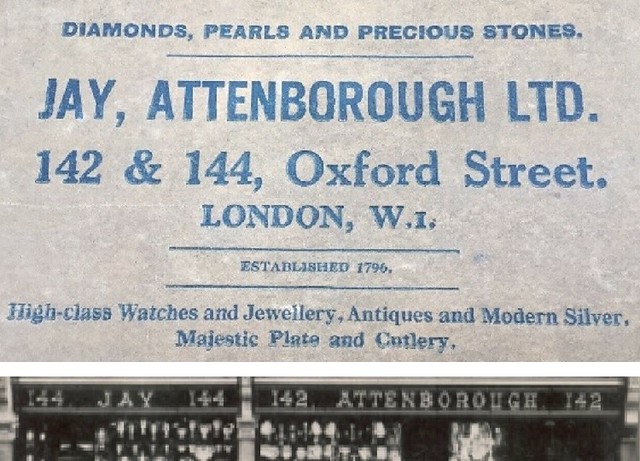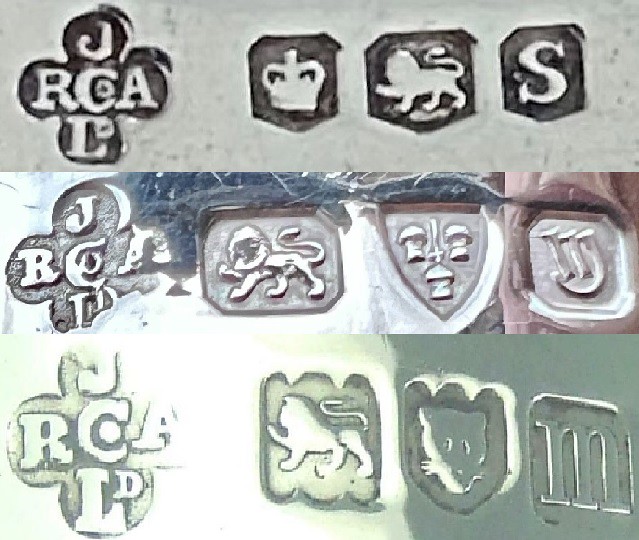Jay, Richard Attenborough & Co Ltd (routinely known as "Jays")
142 & 144, Oxford Street, London
This was a company with multiple facets to its business as shown by this box lid advert and evidently established in 1796. This "established in 1796" likely relates to an "Attenborough" aspect to the company.

This "Jay, Richard Attenborough & Co Ltd" named company was in fact established in 1904 when developed from a company "James Jay Ltd". A James Jay had established the business around 1865 at 366 Essex Rd Islington (one reference suggests an early Brighton connection). This James Jay acquired a business of Richard Attenborough & Co in 1887 including the Oxford Street premises. James Jay died in the mid 1890's and family continued "James Jay Ltd". Robert William Jay continued at the 366 Essex Rd premises and James Charles Jay, described as a nephew, was at Oxford Street.
Both the early "Jay" and "Attenborough" concerns were associated with pawnbroking, maybe the starting point for the gem businesses.
In the Business Directory of London, 1884. [Part 1: Alphabetical Section], James Jay is a "pawnbroker & c" at 366 Essex Rd, Islington (I do not know what "& c" represents here). Two years prior, in the Post Office London Directory, 1882. [Part 3: Trades & Professional Directory) James Jay is also a Silversmith at 366 Essex Rd. The website silvermakersmarks.co.uk mentions a "JJ" mark registered at London in "Mar 1878". No image is shown, but it is mentioned with the makers marks registered by "James Charles Jay". The Post Office London Trades Directory for 1891 also has Jay James as a Pawnbroker and working silversmith at 366 Essex Street. "James Charles Jay" silver marks were registered in Oct 1895 and Jan 1897 with Oxford St. as the address a little prior to the Jay, Richard Attenborough & Co Ltd period. A Robert William Jay also registered a London silver mark in Nov 1897 but there is no address given with this entry. 366 Essex Rd ought to be the address as Jay Robert Wm was here as a silversmith in Kelly's London Suburban Directory, 1901. [Vol. I: Northern. Part 1: Street & Commercial Directories].
The setting up of "Jay, Richard Attenborough & Co Ltd" in 1904 meant they registered their own silver marks, registered Jun 1904 London, registered Jun 1904 Sheffield, registered Sep 1905 Chester and much later at Birmingham. A quatrefoil mark is the one most frequently see.

They made a fairly wide range of silver items but they also acted as retailers of electroplated ware including using their own trade name “Majestic Plate”. There is also information on "Jay, Richard Attenborough & Co Ltd" in another Forum "Jays" post referenced below.
viewtopic.php?f=18&t=30935#p76998
Jay, Richard Attenborough & Co Ltd is suggested to have gone out of business in the mid 20th century, maybe the 1960-70s as "silvermakersmarks" records “silver” by them being hallmarked in London 1963.
What I have not been able to determine is who was involved in "Jay, Richard Attenborough & Co Ltd". I do not think "Robert William Jay" was involved. The "Post Office London Directory, 1910. [Vol. I. Part 2: Street Directory]" says Robert was a jeweller at 364 & 366 Essex Road. Robert had been a silversmith at number 366 in 1899 and 1901 directories.
One reference has an associated matriarch named "Emma Elizabeth Jay" as being part of "James Jay Ltd". Could this family member have been part of the new company? Was a "Richard Attenborough" a partner as his business was previously at 142 Oxford St. Or was it just good business as his name was still above that shop? Note my first image.
The Kelly's London Suburban Directory, 1901. [Vol. I: Northern. Part 1: Street & Commercial Directories] gives an interesting observation that the company name was being used before the company was formed. They were described as pawnbrokers but they appeared to have a silversmithing concern practically on site. There is information on "Wright and Davies" on silvermakersmarks.co.uk.

If Richard Attenborough was a partner, which Richard would it have been and which Richard Attenborough was bought out in 1887? Was it the Richard Attenborough & Co, Goldsmiths of 68 Oxford Street or one of the other "Richards"?
If anyone wishes to find which one it may have been here are a few "Richards" and other "Attenboroughs" to choose from.

To the left is from the Post Office London Directory (Small Edition) 1852 and to the right is from Morris's Business Directory of London 1884
Fishless




























